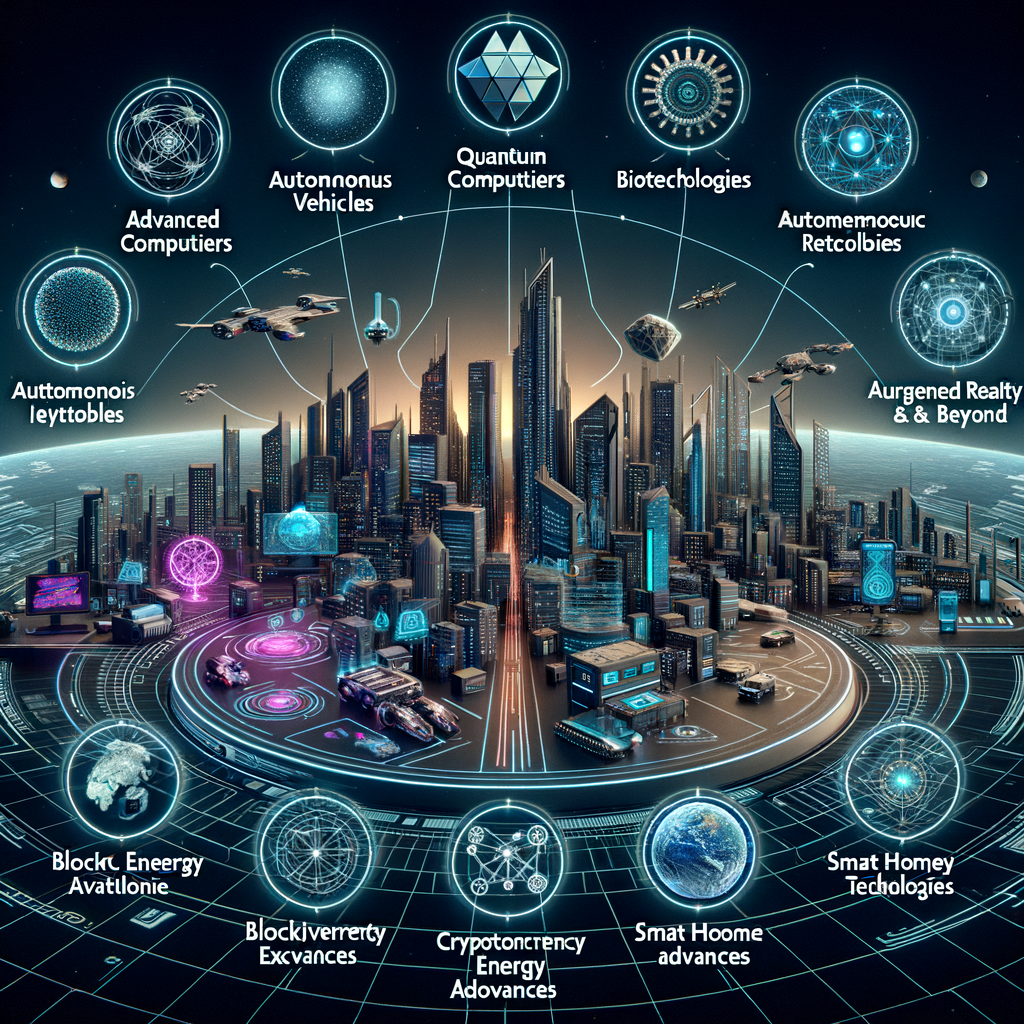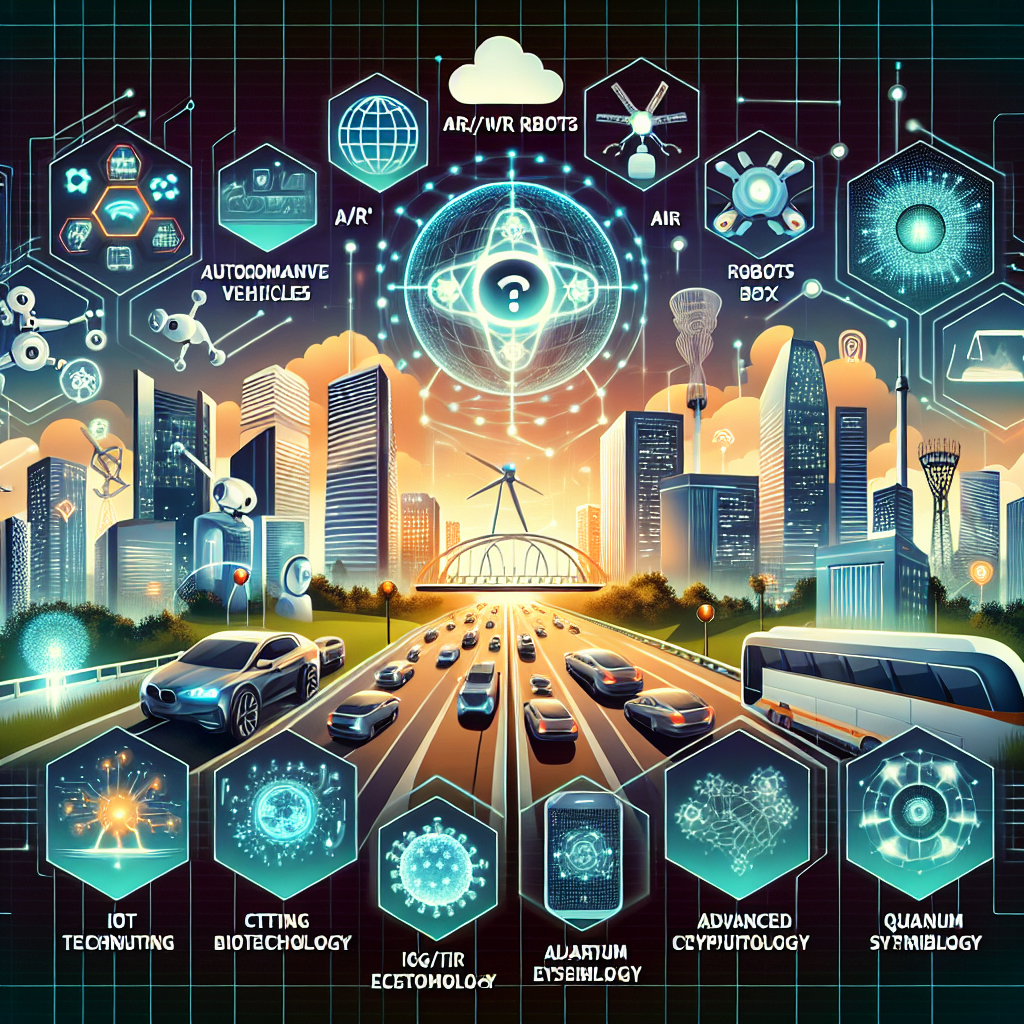“Shaping the Future: The Top Ten Tech Innovations of 2024”
Thank you for reading this post, don't forget to subscribe!Introduction
The world of technology is constantly evolving, and the year 2024 is expected to bring about some groundbreaking innovations that will shape the future. From advancements in artificial intelligence and machine learning to the rise of 5G networks and the Internet of Things, the next few years will see a surge in new technologies that will transform the way we live and work. In this introduction, we will explore ten of the most anticipated innovations in technology that are set to make a significant impact in 2024.
The Evolution of Artificial Intelligence: Ethical Considerations and Applications in Daily Life
As we look ahead to 2024, it is clear that technology will continue to play a significant role in shaping our daily lives. Among the many innovations that are expected to emerge, artificial intelligence (AI) stands out as one of the most transformative. With its ability to analyze vast amounts of data, make predictions, and automate tasks, AI has the potential to revolutionize industries ranging from healthcare to transportation. However, as AI becomes more integrated into our lives, it also raises important ethical considerations that must be addressed.
One of the key ethical concerns surrounding AI is the potential for bias. AI systems are only as good as the data they are trained on, and if that data is biased, the AI will be too. This can lead to discriminatory outcomes, particularly in areas such as hiring, lending, and criminal justice. To mitigate this risk, it is essential that AI developers prioritize diversity and inclusion in their training data and algorithms. Additionally, transparency and accountability will be crucial in ensuring that AI systems are fair and just.
Another ethical consideration is the impact of AI on employment. As AI becomes more capable of performing tasks that were once the domain of humans, there is a risk that it could lead to job displacement. While some argue that AI will create new jobs and industries, others worry that it could exacerbate inequality and leave many workers behind. To address this concern, policymakers and business leaders must work together to ensure that workers have the skills and support they need to thrive in an AI-driven economy.
Despite these challenges, the potential applications of AI in daily life are vast and exciting. In healthcare, for example, AI is already being used to analyze medical images, predict patient outcomes, and personalize treatment plans. In the future, AI could help to identify diseases earlier, improve the accuracy of diagnoses, and even assist with surgeries. Similarly, in transportation, AI is being used to develop self-driving cars that could reduce accidents, ease traffic congestion, and make transportation more accessible for those who are unable to drive.
In the home, AI is becoming increasingly integrated into smart devices and appliances. From voice-activated assistants to intelligent thermostats, AI is making our homes more comfortable, convenient, and energy-efficient. In the future, AI could help us to better manage our time, automate household chores, and even monitor our health and well-being.
As we look to 2024 and beyond, it is clear that AI will continue to shape our world in profound ways. However, it is also clear that we must approach this technology with caution and care. By addressing the ethical considerations and ensuring that AI is developed and deployed responsibly, we can harness its potential to improve our lives and create a better future for all.
The Future of Renewable Energy: Innovations in Solar and Wind Power
As we look ahead to 2024, it is clear that the future of renewable energy is bright. With the increasing demand for clean and sustainable energy sources, innovations in solar and wind power are set to shape the way we generate and consume electricity. In this article, we will explore ten of the most exciting technological advancements that are poised to revolutionize the renewable energy sector in the coming years.
One of the most significant innovations in solar power is the development of perovskite solar cells. These cells are made from a unique material that has the potential to be more efficient and cost-effective than traditional silicon-based solar cells. Perovskite solar cells are also lightweight and flexible, making them ideal for use in a wide range of applications, from building-integrated photovoltaics to portable solar chargers.
Another exciting development in solar power is the emergence of floating solar farms. These innovative installations are designed to float on bodies of water, such as reservoirs and lakes, and can generate electricity without taking up valuable land space. Floating solar farms also have the added benefit of reducing water evaporation, which can help to conserve precious water resources.
In the realm of wind power, one of the most promising innovations is the development of airborne wind turbines. These turbines are designed to float high in the sky, where the wind is stronger and more consistent. Airborne wind turbines have the potential to generate more electricity than traditional ground-based turbines, and they can be deployed in remote areas where traditional wind farms are not feasible.
Another exciting advancement in wind power is the use of advanced materials to create more efficient and durable turbine blades. These materials, such as carbon fiber composites, are lighter and stronger than traditional materials, which can help to increase the efficiency and lifespan of wind turbines.
In addition to these technological advancements, there are also several innovations in energy storage that will play a crucial role in the future of renewable energy. One of the most promising developments is the use of flow batteries, which can store large amounts of energy for long periods of time. Flow batteries are ideal for use in conjunction with renewable energy sources, as they can help to smooth out the variability of solar and wind power.
Another exciting innovation in energy storage is the development of solid-state batteries. These batteries are more compact and have a higher energy density than traditional lithium-ion batteries, making them ideal for use in electric vehicles and other applications where space is at a premium.
As we look ahead to 2024, it is clear that the future of renewable energy is full of exciting possibilities. With these ten innovations in solar and wind power, we can expect to see a significant increase in the use of clean and sustainable energy sources. These advancements will not only help to reduce our reliance on fossil fuels, but they will also play a crucial role in the fight against climate change. As we continue to push the boundaries of what is possible in renewable energy, we can look forward to a brighter, cleaner, and more sustainable future.
Breakthroughs in Biotechnology: Advancements in Gene Editing and Personalized Medicine
As we look ahead to 2024, it is clear that technology will continue to play a pivotal role in shaping our world. In particular, breakthroughs in biotechnology are poised to revolutionize the way we approach healthcare and medicine. From advancements in gene editing to personalized medicine, these innovations have the potential to transform the way we diagnose, treat, and prevent diseases.
One of the most exciting developments in biotechnology is the advancement of gene editing techniques. CRISPR-Cas9, a revolutionary gene-editing tool, has already made headlines for its ability to precisely edit DNA sequences. This technology has the potential to cure genetic diseases, such as sickle cell anemia and cystic fibrosis, by correcting the underlying genetic mutations. As we move into 2024, we can expect to see further advancements in gene editing that will make the technology even more precise and accessible.
Another area of biotechnology that is set to make a significant impact in 2024 is personalized medicine. This approach to healthcare involves tailoring medical treatments to an individual’s unique genetic makeup. By analyzing a patient’s DNA, doctors can identify the most effective treatments and medications for their specific condition. This personalized approach has the potential to improve patient outcomes and reduce the risk of adverse reactions to medications.
In addition to gene editing and personalized medicine, we can also expect to see advancements in other areas of biotechnology. For example, researchers are working on developing new ways to deliver drugs to specific parts of the body, such as using nanoparticles to target cancer cells. This targeted approach to drug delivery could improve the effectiveness of treatments and reduce the risk of side effects.
Another area of biotechnology that is set to make a significant impact in 2024 is regenerative medicine. This field focuses on repairing or replacing damaged tissues and organs. Researchers are working on developing new techniques for growing tissues and organs in the lab, which could be used to treat a wide range of conditions, from heart disease to spinal cord injuries.
As we look ahead to 2024, it is clear that biotechnology will continue to be a driving force in the field of medicine. These innovations have the potential to improve the lives of millions of people around the world. However, it is important to note that these advancements also raise ethical and regulatory questions that will need to be addressed. As we move forward, it will be crucial to ensure that these technologies are used responsibly and for the benefit of all.
In conclusion, the ten innovations in technology that will shape 2024 are set to revolutionize the way we approach healthcare and medicine. From gene editing to personalized medicine, these breakthroughs in biotechnology have the potential to transform the way we diagnose, treat, and prevent diseases. As we move into the future, it is clear that these advancements will have a profound impact on our world, and it is an exciting time to be a part of this rapidly evolving field.
The Impact of 5G Technology on Smart Cities and IoT
As we look ahead to 2024, it is clear that technology will continue to play a pivotal role in shaping our world. From advancements in artificial intelligence to the rise of quantum computing, the next few years promise to bring about significant changes in the way we live and work. One of the most exciting developments on the horizon is the widespread adoption of 5G technology, which has the potential to revolutionize the way we think about smart cities and the Internet of Things (IoT).
5G technology is the fifth generation of wireless communication, and it promises to deliver faster speeds, lower latency, and more reliable connections than ever before. With 5G, we can expect to see download speeds that are up to 100 times faster than 4G, which will enable us to stream high-definition video, download large files, and play online games with virtually no lag. This will have a profound impact on the way we consume content and interact with the digital world.
But the benefits of 5G go far beyond faster internet speeds. One of the most significant advantages of 5G is its ability to support a massive number of connected devices. This will be a game-changer for the IoT, which refers to the network of physical objects that are embedded with sensors, software, and other technologies to connect and exchange data with other devices and systems over the internet. With 5G, we can expect to see an explosion in the number of connected devices, from smart home appliances to autonomous vehicles, and everything in between.
The impact of 5G on smart cities will be particularly profound. Smart cities are urban areas that use technology to improve the quality of life for their residents, by optimizing traffic flow, reducing energy consumption, and enhancing public safety, among other things. With 5G, smart cities will be able to collect and analyze data in real-time, enabling them to make more informed decisions and respond more quickly to changing conditions. For example, 5G could enable traffic lights to adjust their timing based on the flow of traffic, reducing congestion and improving air quality.
Another area where 5G will have a significant impact is in the field of healthcare. With 5G, we can expect to see the rise of telemedicine, which will enable patients to consult with doctors remotely, using high-definition video conferencing. This will be particularly beneficial for people living in rural areas, who may not have easy access to healthcare facilities. Additionally, 5G will enable the use of wearable devices that can monitor patients’ vital signs in real-time, allowing doctors to provide more personalized care.
In conclusion, the innovations in technology that will shape 2024 are numerous and varied, but the impact of 5G technology on smart cities and IoT is likely to be one of the most significant. With faster speeds, lower latency, and more reliable connections, 5G will enable us to connect more devices, collect more data, and make more informed decisions. As we look ahead to the future, it is clear that 5G will play a critical role in shaping the way we live and work, and it is an exciting time to be a part of this technological revolution.
The Rise of Quantum Computing: How It Will Revolutionize Industries
As we look ahead to 2024, it’s clear that technology will continue to play a pivotal role in shaping our world. From advancements in artificial intelligence to the rise of quantum computing, the next few years promise to bring about significant changes in the way we live and work. In this article, we’ll explore ten innovations in technology that are poised to have a major impact on various industries in the near future.
One of the most exciting developments on the horizon is the rise of quantum computing. This cutting-edge technology has the potential to revolutionize industries by solving complex problems that are currently beyond the capabilities of classical computers. Quantum computers use quantum bits, or qubits, which can exist in multiple states simultaneously, allowing them to perform calculations at an unprecedented speed. This could have a profound impact on fields such as cryptography, drug discovery, and financial modeling, to name just a few.
Another innovation that is set to shape the future is the continued advancement of artificial intelligence. AI has already made significant strides in recent years, but we can expect to see even more sophisticated applications in the coming years. From self-driving cars to virtual assistants, AI will become increasingly integrated into our daily lives, making tasks easier and more efficient.
The Internet of Things (IoT) is another area that is expected to see significant growth in the next few years. With the proliferation of connected devices, we’ll see a greater emphasis on smart homes, cities, and industries. This will enable us to collect and analyze data in real-time, leading to more informed decision-making and improved efficiency.
In the realm of healthcare, we can expect to see advancements in telemedicine and wearable technology. Telemedicine will allow patients to receive medical care remotely, reducing the need for in-person visits and making healthcare more accessible. Wearable technology, on the other hand, will enable us to monitor our health more closely, providing valuable insights into our well-being.
Another area that is set to undergo significant change is the field of renewable energy. With the growing concern over climate change, there is a push towards more sustainable energy sources. Innovations in solar and wind power, as well as advancements in battery technology, will make renewable energy more viable and cost-effective.
In the world of entertainment, virtual and augmented reality will continue to gain traction. These technologies will provide new ways for us to experience content, from immersive video games to virtual concerts. As the technology becomes more accessible, we can expect to see a wider range of applications in both the consumer and enterprise markets.
Finally, we can’t talk about the future of technology without mentioning the impact of 5G. This next-generation wireless technology will provide faster and more reliable internet connections, enabling a host of new applications and services. From smart cities to autonomous vehicles, 5G will be a key enabler of many of the innovations we’ve discussed.
In conclusion, the next few years promise to be an exciting time for technology. From quantum computing to 5G, these ten innovations will shape the way we live and work in 2024 and beyond. As we continue to push the boundaries of what’s possible, we can look forward to a future that is more connected, efficient, and sustainable.
Conclusion
In conclusion, the ten innovations in technology that will shape 2024 are expected to bring significant advancements in various fields, including artificial intelligence, quantum computing, 5G networks, biotechnology, autonomous vehicles, renewable energy, blockchain, virtual and augmented reality, edge computing, and the Internet of Things. These innovations will not only enhance our daily lives but also drive economic growth and address global challenges.









